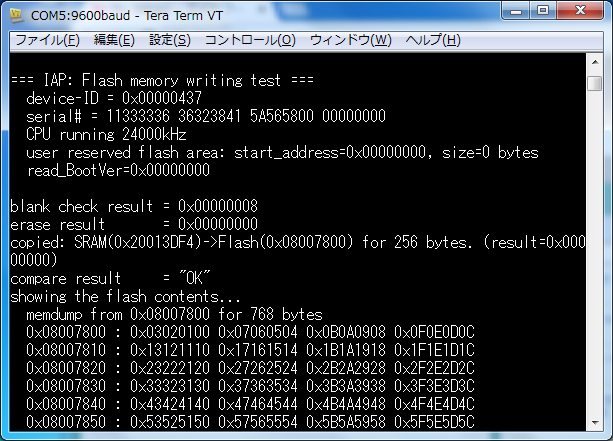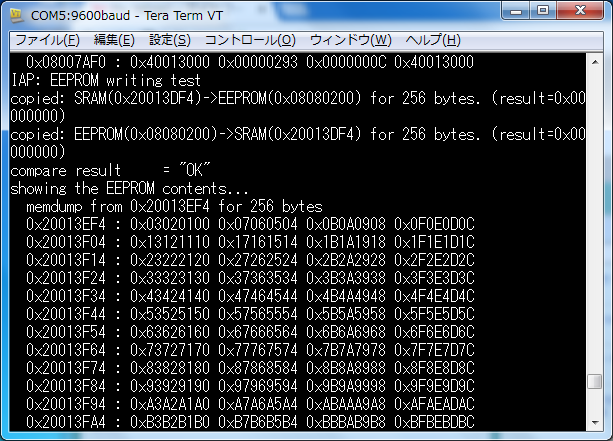STM32_IAP demo.
Fork of IAP_internal_flash_write by
main.cpp
- Committer:
- va009039
- Date:
- 2016-04-30
- Revision:
- 10:f3e4dd858adb
- Parent:
- 9:ae7747b119c1
File content as of revision 10:f3e4dd858adb:
/** IAP demo : demo code for internal Flash memory access library
*
* The internal Flash memory access is described in the LPC1768 and LPC11U24 usermanual.
* http://www.nxp.com/documents/user_manual/UM10360.pdf
* http://www.nxp.com/documents/user_manual/UM10462.pdf
*
* LPC1768 --
* Chapter 2: "LPC17xx Memory map"
* Chapter 32: "LPC17xx Flash memory interface and programming"
* refering Rev. 01 - 4 January 2010
*
* LPC11U24 --
* Chapter 2: "LPC11Uxx Memory mapping"
* Chapter 20: "LPC11Uxx Flash programming firmware"
* refering Rev. 03 - 16 July 2012
*
* This main.cpp demonstrates how the flash can be erased and wrote.
*
* This program tries to...
* 0. read device ID and serial#
* 1. check if the targat sector blank
* 2. erase the sector if it was not blank
* 3. write into the flash (prepare before write)
* 4. verify the data by IAP command
* 5. show the content of the flash
*
* The Flash must be erased as sectors. No overwrite can be done like SRAM.
* So erase should be done in size of 4K or 32K.
*
* Writing sector can be done with size of 256, 512, 1024 or 4096.
* If other size is used, the IAP returns an error.
* The SRAM memory should be allocated in
*
*
* Released under the MIT License: http://mbed.org/license/mit
*
* revision 1.0 09-Mar-2010 1st release
* revision 1.1 12-Mar-2010 chaged: to make possible to reserve flash area for user
* it can be set by USER_FLASH_AREA_START and USER_FLASH_AREA_SIZE in IAP.h
* revision 2.0 26-Nov.2012 LPC11U24 code added
* revision 2.1 26-Nov-2012 EEPROM access code imported from Suga koubou san's (http://mbed.org/users/okini3939/) library
* http://mbed.org/users/okini3939/code/M0_EEPROM_test/
* revision 3.0 09-Jan-2015 LPC812 and LPC824 support added
* revision 3.1 13-Jan-2015 LPC1114 support added
* revision 3.1.1 16-Jan-2015 Target MCU name changed for better compatibility across the platforms
* revision 3.1.2 10-Mar-2015 merged with pull requests. reinvoke_isp() added and modified read_serial() to return a pointer.
*/
#include "mbed.h"
#include "IAP.h"
#define MEM_SIZE 256
#if defined(TARGET_LPC176X)
#define TARGET_SECTOR 29 // use sector 29 as target sector if it is on LPC1768
#elif defined(TARGET_LPC11UXX) || defined(TARGET_LPC11XX)
#define TARGET_SECTOR 7 // use sector 7 as target sector if it is on LPC11U24
#define TARGET_EEPROM_ADDRESS 64
#define TARGET_EEPROM_ADDRESS 64
#elif defined(TARGET_LPC81X) || defined(TARGET_LPC82X)
#define TARGET_SECTOR 15 // use sector 15 as target sector if it is on LPC812
#elif defined(TARGET_NUCLEO_L152RE)||defined(TARGET_NUCLEO_F042K6)||defined(TARGET_NUCLEO_F103RB)
#define TARGET_SECTOR (0x7800/FLASH_PAGE_SIZE)
#define TARGET_EEPROM_ADDRESS (FLASH_EEPROM_BASE + 0x200)
struct {
char* operator[](int sector) const {
return reinterpret_cast<char*>(FLASH_BASE + sector * FLASH_PAGE_SIZE);
}
} sector_start_adress;
#elif defined(TARGET_NUCLEO_L031K6)
#define TARGET_SECTOR (0x7800/FLASH_PAGE_SIZE)
#define TARGET_EEPROM_ADDRESS (DATA_EEPROM_BASE + 0x200)
struct {
char* operator[](int sector) const {
return reinterpret_cast<char*>(FLASH_BASE + sector * FLASH_PAGE_SIZE);
}
} sector_start_adress;
#elif defined(TARGET_NUCLEO_F401RE)||defined(TARGET_NUCLEO_F411RE)||defined(TARGET_NUCLEO_F446RE)
#define TARGET_SECTOR 3
struct {
char* operator[](int sector) const {
static const uint32_t offset[8] = {0x00000, 0x04000, 0x08000, 0xc000, 0x10000, 0x20000, 0x40000, 0x60000};
return reinterpret_cast<char*>(FLASH_BASE + offset[sector]);
}
} sector_start_adress;
#endif
void memdump( char *p, int n );
int isprint( int c );
IAP iap;
int main()
{
char mem[ MEM_SIZE ]; // memory, it should be aligned to word boundary
int *serial_number;
int r;
printf( "\r\n\r\n=== IAP: Flash memory writing test ===\r\n" );
printf( " device-ID = 0x%08X\r\n", iap.read_ID() );
serial_number = iap.read_serial();
printf( " serial# =" );
for ( int i = 0; i < 4; i++ )
printf( " %08X", *(serial_number + i) );
printf( "\r\n" );
printf( " CPU running %dkHz\r\n", SystemCoreClock / 1000 );
printf( " user reserved flash area: start_address=0x%08X, size=%d bytes\r\n", iap.reserved_flash_area_start(), iap.reserved_flash_area_size() );
printf( " read_BootVer=0x%08X\r\r\n", iap.read_BootVer() );
for ( int i = 0; i < MEM_SIZE; i++ )
mem[ i ] = i & 0xFF;
// blank check: The mbed will erase all flash contents after downloading new executable
r = iap.blank_check( TARGET_SECTOR, TARGET_SECTOR );
printf( "blank check result = 0x%08X\r\n", r );
// erase sector, if required
if ( r == SECTOR_NOT_BLANK ) {
iap.prepare( TARGET_SECTOR, TARGET_SECTOR );
r = iap.erase( TARGET_SECTOR, TARGET_SECTOR );
printf( "erase result = 0x%08X\r\n", r );
}
// copy RAM to Flash
iap.prepare( TARGET_SECTOR, TARGET_SECTOR );
r = iap.write( mem, sector_start_adress[ TARGET_SECTOR ], MEM_SIZE );
printf( "copied: SRAM(0x%08X)->Flash(0x%08X) for %d bytes. (result=0x%08X)\r\n", mem, sector_start_adress[ TARGET_SECTOR ], MEM_SIZE, r );
// compare
r = iap.compare( mem, sector_start_adress[ TARGET_SECTOR ], MEM_SIZE );
printf( "compare result = \"%s\"\r\n", r ? "FAILED" : "OK" );
//#define WRITE_NEXT_BLOCK
#ifdef WRITE_NEXT_BLOCK
// copy RAM to Flash
iap.prepare( TARGET_SECTOR, TARGET_SECTOR );
r = iap.write( mem, sector_start_adress[ TARGET_SECTOR ] + 256, MEM_SIZE );
printf( "copied: SRAM(0x%08X)->Flash(0x%08X) for %d bytes. (result=0x%08X)\r\n", mem, sector_start_adress[ TARGET_SECTOR ], MEM_SIZE, r );
// compare
r = iap.compare( mem, sector_start_adress[ TARGET_SECTOR ] + 256, MEM_SIZE );
printf( "compare result = \"%s\"\r\n", r ? "FAILED" : "OK" );
#endif
printf( "showing the flash contents...\r\n" );
memdump( sector_start_adress[ TARGET_SECTOR ], MEM_SIZE * 3 );
#if defined(TARGET_LPC81X) || defined(TARGET_LPC82X)
iap.prepare( TARGET_SECTOR, TARGET_SECTOR );
r = iap.erase_page( 241, 241 ); // 241 is page number for sector 7 with 64 byte offset
printf( "\r\nerase page test\r\n" );
printf( "erase page result = \"%s\"\r\n", r ? "FAILED" : "OK" );
printf( "showing memory dump to confirm 0x00003C40 to 0x00003C7F are erased (should be changed to 0xFF)" );
memdump( sector_start_adress[ TARGET_SECTOR ], MEM_SIZE );
#endif
#if defined(TARGET_LPC11UXX)||defined(TARGET_STM32L1)||defined(TARGET_STM32L0) // SAMPLE OF EEPROM ACCESS (LPC11U24 only)
printf( "IAP: EEPROM writing test\r\n" );
char mem2[ MEM_SIZE ];
r = iap.write_eeprom( mem, (char*)TARGET_EEPROM_ADDRESS, MEM_SIZE );
printf( "copied: SRAM(0x%08X)->EEPROM(0x%08X) for %d bytes. (result=0x%08X)\r\n", mem, TARGET_EEPROM_ADDRESS, MEM_SIZE, r );
r = iap.read_eeprom( (char*)TARGET_EEPROM_ADDRESS, mem2, MEM_SIZE );
printf( "copied: EEPROM(0x%08X)->SRAM(0x%08X) for %d bytes. (result=0x%08X)\r\n", TARGET_EEPROM_ADDRESS, mem, MEM_SIZE, r );
// compare
r = memcmp(mem, mem2, MEM_SIZE);
printf( "compare result = \"%s\"\r\n", r ? "FAILED" : "OK" );
printf( "showing the EEPROM contents...\r\n" );
memdump( mem2, MEM_SIZE );
#endif
}
void memdump( char *base, int n )
{
unsigned int *p;
printf( " memdump from 0x%08X for %d bytes", (unsigned long)base, n );
p = (unsigned int *)((unsigned int)base & ~(unsigned int)0x3);
for ( int i = 0; i < (n >> 2); i++, p++ ) {
if ( !(i % 4) )
printf( "\r\n 0x%08X :", (unsigned int)p );
printf( " 0x%08X", *p );
}
printf( "\r\n" );
}


